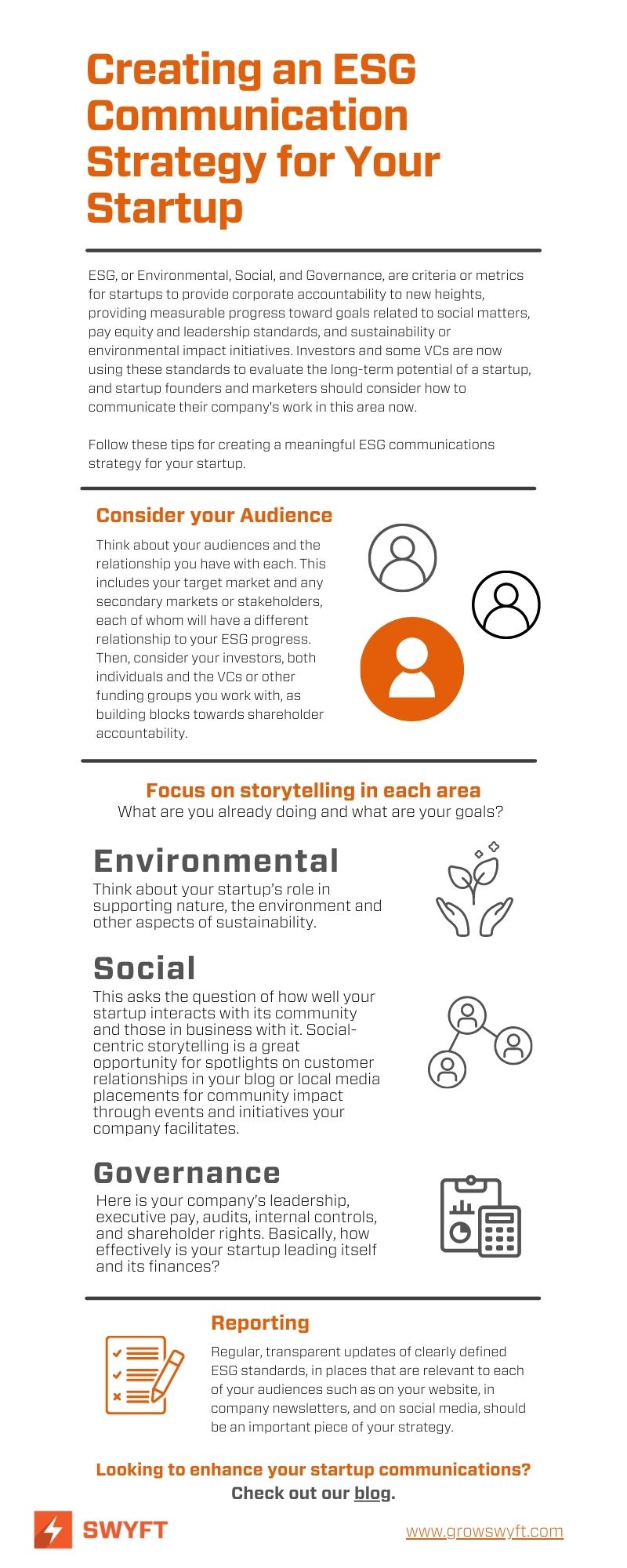As an investor, you may have heard about ESG, or environment, social, and governance, as it relates to criteria for investments or talking points for a business’s success and sustainability. As a startup founder or marketer, you may also know it as a new standard for corporate social responsibility (CSR), or the impact your company makes on the environment and community.
Recently, ESG has taken corporate accountability to a new level, as reflected in a piece for PR Daily which said, “While CSR programs typically refer to a company’s accountability on social matters, ESG elevates those activities to make them measurable in a way that shows the bottom-line impact of corporate social values, and more importantly, actions.”
This is important for startups because socially-conscious companies appeal to socially-conscious consumers and investors. A strong ESG performance indicates a company has what it takes to be successful long term. By that measure, venture capital firms are also beginning to apply a similar approach when evaluating a startup for funding.
While it is a startup executives’ responsibility to implement and measure ESG criteria, marketing and PR professionals, or a tech PR agency, are thereby tasked with communicating their efficacy to the public. What may have worked with your CSR communications in the past may work here, but taking a new approach to this new model is likely to attract attention and sustain interest – so long as you remain consistent.
To get you started, we recommend following these tips for creating a meaningful ESG communications strategy for your startup, which your team or a tech PR agency can help implement meaningfully.
All About Audiences
Think about your audiences and the relationship you have with each. This includes your target market and any secondary markets or stakeholders, each of whom will have a different relationship to your ESG progress. Your customers may be more interested in the identity of your company as one which is environmentally responsible or employing DEI best practices by treating its employees well through fair hiring practices or equitable compensation, than in its leadership style, for example.
The heart of CSR is a company’s accountability to itself and its shareholders, so what does that look like as a smaller startup? Consider your investors, both individuals and the VCs or other funding groups you work with, as building blocks towards this model. Continued communication of progress toward ESG goals demonstrates the success of your company to investors and that their long term investment is a good one. This will remain true if your company goes public, and will be benefited by the work you did establishing it when it was still just Series A-funded.
Storytelling for E, S, and G
ESG focuses on details about your startup that often go unsung. Many communicators spend their time on breaking news or product launches and neglect to showcase how well their organization is governed or its sustainability practices – and often with good reason. However, as ESG grows in importance, be sure not to neglect it in your messaging, even within those other big news items or announcements. Break down the impact you’re making and what your measurable and time-bound environmental, social, and governance goals are. For instance:
- Environmental criteria consider how a company performs as a steward of nature. Think about your startup’s role in supporting nature, the environment and other aspects of sustainability. How is your new product or service mindful of its environmental impact, or solving an environmental problem? Perhaps you’re moving – is that new office space using green energy? Or, you might articulate your startup’s goal for reducing its carbon footprint this year and how it plans to do so.
- Social criteria examine how a business manages its relationships with employees, suppliers, customers, and the communities where it operates. This asks the question of how well your startup interacts with its community and those in business with it. Social-centric storytelling is a great opportunity for spotlights on customer relationships in your blog or local media placements for community impact through events and initiatives your company facilitates (both of which have an added benefit of driving your SEO). Or do you have a goal, such as diversifying your suppliers or markets to provide more equitable access to the benefit your company provides? Don’t neglect this powerful storytelling theme as a tool in your communications arsenal.
- Governance deals with a company’s leadership, executive pay, audits, internal controls, and shareholder rights. These details often go untold in your marketing messages, but should receive attention under the ESG model. How effectively is your startup leading itself and its finances? Consider how that story can be told differently to each audience and make clear your goals for growth, especially with leadership and investment stakeholders.
Reporting
Finally, an important piece of telling the ESG story of your startup is consistent reporting. What are the metrics and standards for your startup for your ESG performance? How are you performing with those items this quarter/year? Regular, transparent updates in places that are relevant to each of your audiences, such as on your website, in company newsletters, and on social media should be an important piece of your communications strategy.
With all things relating to accountability, the biggest takeaway for a successful ESG communication strategy is to remain transparent and keep telling the story. So keep at it, and consider hiring in a tech PR agency, who can focus on the strategic wins and progress of your startup and tie those themes into press releases and media pitches.


